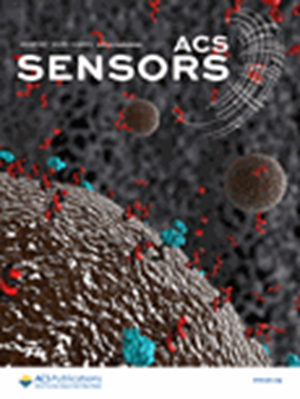生物体液中皮质醇的特异性检测:一种定制的电化学适体感应方法。
IF 9.1
1区 化学
Q1 CHEMISTRY, ANALYTICAL
引用次数: 0
摘要
皮质醇是一种参与生理和病理过程的关键内源性激素,其水平在生物体液中受多种因素影响而波动,包括炎症性疾病。因此,准确和有选择性地检测皮质醇对于诊断这些疾病和评估治疗效率至关重要。电化学方法具有成本低、灵敏度高、特异度高、微型化和原位分析能力强等优点,在生物样品生物标志物分析中具有重要的优势。本研究的目的是设计一个定制的平台,用于生物样品中皮质醇的特定电化学检测,在便携式生物医学设备中具有潜在的应用前景。制作灵活的定制碳电极,并使用Au和Pt修饰工作电极的表面,以提高灵敏度,并使用适体提高皮质醇检测的特异性。利用循环伏安法、电化学阻抗谱和x射线光电子能谱对改性步骤进行了验证。通过循环伏安法进行皮质醇检测,并评估平台的分析性能,包括检测限、定量限和灵敏度。该传感器能够在0.5 ~ 100 nM的线性范围内测定分析物,检测限为0.1 nM。此外,该传感器还被用于分析患者和健康受试者的唾液和汗液样本。这种适体传感器能够对皮质醇进行特异性检测,并有可能进一步开发用于即时医疗应用。本文章由计算机程序翻译,如有差异,请以英文原文为准。
Specific Detection of Cortisol in Biological Fluids: A Tailored Electrochemical Aptasensing Approach.
Cortisol is a key endogenous hormone involved in physiological and pathological processes, its levels fluctuating in biological fluids due to numerous factors, including inflammatory disorders. Therefore, the accurate and selective detection of cortisol is essential for both diagnosing these conditions and evaluating treatment efficiency. Electrochemical methods offer significant advantages for biomarker analysis in biological samples due to their low cost, high sensitivity and specificity, potential for miniaturization, and capability for in situ analysis. The goal of this study was to design a customized platform for the specific electrochemical detection of cortisol in biological samples, with potential applications in portable biomedical devices. Flexible, customized carbon electrodes were fabricated, and the surface of the working electrodes was modified using Au and Pt, to enhance sensitivity, and an aptamer to increase specificity for cortisol detection. All the modification steps were validated using cyclic voltammetry, electrochemical impedance spectroscopy, and X-ray photoelectron spectroscopy. Cortisol detection was performed via cyclic voltammetry, and the platforms were assessed for their analytical performance, including the limit of detection, limit of quantification, and sensitivity. The aptasensor was able to determine the analyte on a linear domain between 0.5 and 100 nM, with a limit of detection of 0.1 nM. Additionally, the aptasensors were applied for the analysis of saliva and sweat samples collected from patients and healthy subjects as control. This aptasensor enables the specific detection of cortisol and has the potential to be further developed for point-of-care medical applications.
求助全文
通过发布文献求助,成功后即可免费获取论文全文。
去求助
来源期刊

ACS Sensors
Chemical Engineering-Bioengineering
CiteScore
14.50
自引率
3.40%
发文量
372
期刊介绍:
ACS Sensors is a peer-reviewed research journal that focuses on the dissemination of new and original knowledge in the field of sensor science, particularly those that selectively sense chemical or biological species or processes. The journal covers a broad range of topics, including but not limited to biosensors, chemical sensors, gas sensors, intracellular sensors, single molecule sensors, cell chips, and microfluidic devices. It aims to publish articles that address conceptual advances in sensing technology applicable to various types of analytes or application papers that report on the use of existing sensing concepts in new ways or for new analytes.
 求助内容:
求助内容: 应助结果提醒方式:
应助结果提醒方式:


